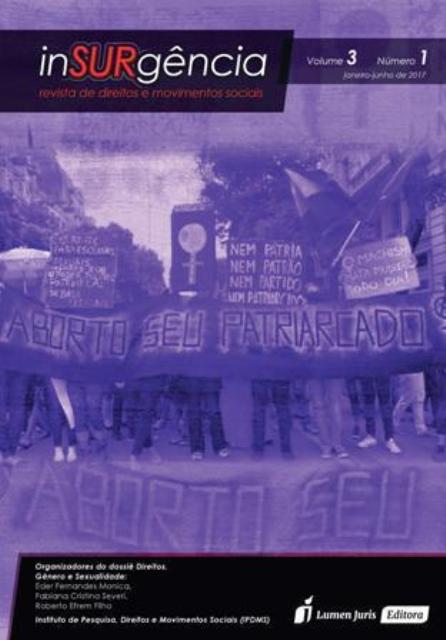A institucionalização da transfobia no direito civil brasileiro
uma análise da possibilidade de anulação do casamento de pessoa transexual
DOI:
https://doi.org/10.26512/insurgncia.v3i1.19378Palabras clave:
Anulação. Casamento. Pessoas transexuais. Transfobia.Resumen
Diante do contexto de violência, discriminação, preconceito e transfobia instaurado no Brasil de hoje, pretendemos analisar a possível anulabilidade do casamento com pessoas transexuais, na hipótese de o cônjuge vir a saber da condição de transgenitalização somente após o matrimônio (PL n. 3875/2012), como forma de violência institucionalizada. Por meio de pesquisa teórica e bibliográfica, examinaremos a doutrina e legislação civilistas sobre anulação do casamento à luz das teorias de gênero. Entendemos que a posição civilista defensora dessa anulabilidade do casamento está motivada pela falta de conhecimento sobre gênero e pela transfobia, culturalmente repassada e ainda pouco questionada, que repercute nos altos índices de violência contra as pessoas transexuais no Brasil e desmascara uma sociedade cissexista, com concepções culturais que precisam ser repensadas.
Citas
BENTO, Berenice. Na escola se aprende que a diferença faz a diferença. Revista Estudos Feministas, Florianópolis, Universidade Federal de Santa Catarina, v. 19, n.2, 2011.
BUTLER, Judith. Problemas de gênero: feminismo e subversão da identidade. Traduzido por Renato Aguiar. 2. ed. Rio de Janeiro: Civilização Brasileira, 2008.
CAZARRÉ, Marieta. Com 600 mortes em 6 anos, Brasil é o que mais mata travestis e transexuais. Agência Brasil, Brasília, 2015. Disponível em: http://agenciabrasil.ebc.com.br/direitos-humanos/noticia/2015-11/com-600-mortes-em-seis-anos-brasil-e-o-que-mais-mata-travestis-e. Acesso em: 7 jun. 2017.
COSSI, Rafael. Corpo em obra: Contribuições para a clínica psicanalítica do transexualismo. Saraiva: São Paulo, 2012.
DIAS, Maria Berenice. Manual de direito das famílias. 11. ed. São Paulo: Revista dos Tribunais, 2016.
FARIAS, Cristiano Chaves de; ROSENVALD, Nelson. Curso de Direito Civil: Famílias. 5. ed. Salvador: Juspodivm, 2014.
GONÇALVES, Carlos Roberto. Direito civil brasileiro: direito de família. Vol 6. 11. ed. São Paulo: Saraiva, 2014.
MATTOS, Amana Rocha; CIDADE, Maria Luiza Rovaris. Para pensar a cisheteronormatividade na psicologia: lições tomadas do transfeminismo. Rev. Periódicus. 2016, v. 1, n. 5, maio-out. p. 132-153.
MELINO, Heloisa. Potência das ruas - direito, linguagens e emancipação: processos de luta e o potencial transformador dos movimentos sociais. Rio de Janeiro: Multifoco, 2017.
MUSSKOPF, André Sidnei. Quando sexo, gênero e sexualidade se encontram. Revista Tempo e Presença: ano 03, nº 08, 2008.
O QUE É CISSEXISMO? Transfeminismo, 200?. Disponível em: https://transfeminismo.com/o-que-e-cissexismo/. Acesso em 9 jun 2017.
RIVERA, Andrés. Derechos civiles de la población trans (trangénero, travesti, transexuales e intersex). In: ERAZO LATORRE, Ximena (Org.). Derechos humanos, diversidad sexual y políticas públicas en América Latina. Santiago: LOM, 2015.
RODRIGUES, Silvio. Direito civil: direito de família. Vol. 06. 28. ed. rev. e atual. São Paulo: Saraiva, 2004.
RODRIGUES, Carla. Butler e a desconstrução do gênero. Rev. Estud. Fem. [online]. 2005, vol.13, n.1, pp.179-183. Disponível em: <http://www.scielo.br/scielo.php?script=sci_arttext&pid=S0104-026X2005000100012>. Acesso em: 7 jun. 2017.
TARTUCE, Flávio. Direito civil: direito de Família. Vol. 5. 11. ed. Rio de Janeiro: Forense, 2016.
TRANSAMÉRICA. Direção: Ducan Tucker. Produção: Linda Moran, Rene Bastian, Sebastian Dungan. [S.I.]: Focus Filme, 2005. (103 min).
YOUTUBE Linn da Quebrada ”“ blasFêmea/Mulher. Disponível em: < https://www.youtube.com/watch?v=-50hUUG1Ppo>. Publicado em: 14 de abr de 2017. Acesso em: 08 jun. 2017.
Descargas
Publicado
Cómo citar
Número
Sección
Licencia
Esta publicación es licenciada bajo una Licencia Creative Commons 4.0, Atribución/Reconocimiento-NoComercial-SinDerivados 4.0 Internacional.














